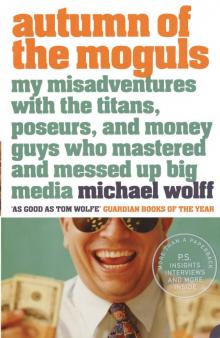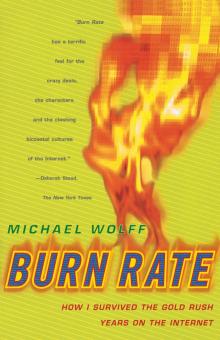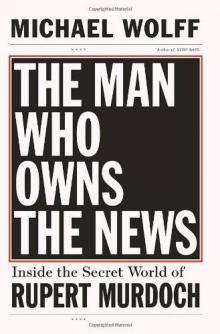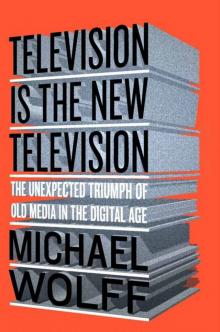- Home
- Michael Wolff
Burn Rate Page 3
Burn Rate Read online
Page 3
“I know Barry,” I say to my friend as we go to our table.
“Shit. You should say hi to him.”
“Oh no.”
“You should. I mean this is a man who knows about this shit. Fuck, he invented the Simpsons and the movie of the week. The man knows a thing or two about inventing media.” My friend wheels back from the table and casts his stunted arm over the banquet guests. “Look at them eat, all the honchos of this industry. Hardly a one has ever run a business. Months ago everyone here was either on an entirely different career track or was a failure at their chosen profession. What do you think the average age of the average cyber CEO is? Twenty-seven? You don’t think that this isn’t a little worrisome? You don’t think that Barry isn’t saying, ‘What the fuck?’ ”
I look at Diller, one of the most successful media executives of our time, sitting in the midst of two hundred executives who have given themselves a mandate to create an altogether new advertising, programming, and communications medium with which to usher in the new millennium.
“I’ll do it,” I nod. “I’m going to speak to him.”
“You want the chair?” my friend offers. “Sometimes it helps.”
Fifteen years before, I had fearfully sat with Diller beside his pool in Coldwater Canyon in Beverly Hills while he spun out a sinisterly brilliant, graphic, and brutal analysis of the entertainment business. He swore me to secrecy then and I cannot remember the details now but I remember being overwhelmed by his mastery of the whole business, of all the pieces—the New York piece, the L.A. piece, the personalities. You couldn’t mention someone without him putting his finger on their weak spot. It was breathtaking. I suspected then that if you wanted not just to run something but to shape it, mold it, remake it, you had to aspire to become like Diller—fevered, Kurtz-like. In my most manic phases I thought, Well, I can do that.
“Barry?” I bow slightly. “Michael Wolff.”
“Oh yeah. Yeah. Hey, man.”
He is the don.
“I’m in the Internet business now.”
He had once been the youngest of the young turks, but his neck had turned to crepe. “Tough business.”
“Well, it brings together a lot of things that I’ve been interested in, I guess. Content. Technology. Distribution. What’s your feeling? Do you think you’ll be moving more in the direction of the Net?” I tried to control my urge to fawn.
“Sure.”
“I guess everybody is. I mean . . . I guess I’ve been lucky, getting in on the ground floor.”
“Yes, if you’re still standing in the end,” said Diller affably. “Nice to see you. Stay in touch.”
Others closed in on him.
“Now wasn’t that worth it?” asked my friend with only slight mockery. “How many times do you think you’ll just casually happen to mention about when you were speaking to Barry in Laguna?”
“Are we that small-time?”
“Hell no, this is big-time. You’re among the most important people in the most important industry in America. It’s going to change the way we communicate, it’s going to change the way we learn, the way we have fun. It’s going to change the entire economy. Haven’t you been listening?”
“Do you believe that?”
“Sure. Don’t you?”
I did. But, frankly, the air of unreality was large, too. It had happened so quickly. Where other industries developed over decades, the Internet industry had popped into being overnight. Who was prepared for it? Not corporate America, not the technology business, not the media industry, and, above all, not the people who suddenly had to create profitable businesses. That’s why there were these conferences. Relationships that in other industries would be formed over the course of a career had to be put into place and cemented over a weekend in this business. The pace of technological development didn’t allow for long lunches and the 6:15 to Scarsdale. This was not a game of golf.
I run into Infoseek’s Robin Johnson at the airport. He’s getting the red-eye, too. Twice a week he gets on a plane on the West Coast at 10:00 P.M. and gets off on the East Coast at 6:00 A.M. He looks terrible, with deep circles under his eyes and puffy skin.
“Maybe we should be talking,” he considers.
“Anytime,” I say eagerly.
“We’re averaging under three impressions per visit. I wonder if we gave them some content, if we gave them something to read, could we get them to stay a little longer,” he says, speaking of content as though it were something like Ritalin.
This was the bottom line. He sold every impression—every click—for approximately $.02. If we could supply the reason for his users to click again, content would be triumphant.
“No question,” I say. “Guarantee, I can double your click rate.” This is selling, I think. Express no doubts. Whatever they want, tell them you can double it. But it makes sense, too. Tell a few jokes, mention a few celebrities, provide a little intelligent comment, people will hang around a while longer, obviously.
“Do you think?” He puts his hand out and steadies himself on my shoulder. “Our share price is in the toilet. The analysts are all over us. Our board wants a profitable first quarter.”
“We can absolutely help you with this! This is what we do. We hold people’s attention. We talk to them. We build a relationship with them. They’ll never want to leave you.” We go down the boarding ramp together and enter the plane. It’s lucky, I think, that I have enough miles for an upgrade to first class so I can use this flight to seal a deal, but Robin, clutching his garment bag, turns toward coach. “I’m used to it,” he says, looking through the curtains at the full cabin. “I’m looking for Gates,” he adds. Bill Gates in coach is one of the industry’s enduring myths.
“I feel guilty.”
“No, no. You content people need your pampering. We’re software. Applications. Clean code. We don’t need creature comforts. This is a revolution.”
Chapter Two
How It Got to Be a Wired World
I had limited interest in the stock market. Other than my own paltry net worth, which grew suspiciously in various mutual funds, I had never felt much of a personal connection to the subtleties or the personalities of the securities industry. Having lived through the market’s collapse in 1987, and having experienced nothing more than some enjoyment at the tremors of anxiety on the Upper East Side and the generally lower real estate prices, I had become even more convinced that the market had little to do with me.
Even after the public offering in August 1995 of shares in Netscape, the Web browser maker with less earnings than my own company, created overnight one of the most valuable corporations in the country, it was still a while before I actually began to understand that people who said “That could be you” were halfway serious. When the college kids out in the Valley started to go public in late ’95 and early ’96, the same ones whose burritos I’d paid for just a few months before—Joe Kraus, a Stanford student whose company, Excite, went public in the spring, kept sticking me with the bill—I reluctantly started to pay attention. People—investment bankers, venture capitalists, industry busybodies—were saying, “You won’t be able to compete if you don’t go public. You need a war chest. Excite has forty million dollars in the bank so it can compete with Yahoo, which has sixty million dollars in the bank from its IPO. What do you have?”
Hmm. My argument that we made money and they did not was not a persuasive one. That other companies now had enough money to buy up the waterfront property while I operated a hot dog stand seemed to be the basic perspective.
But it wasn’t until Wired, with its magazine and Web operations, announced it would go public that I really paid attention. It was, for one thing, a business philosophically and temperamentally near to our own. It wasn’t a software business. It was a media business. Content. Not code. What’s more, Wired’s founder, Louis Rossetto, was someone I certainly would have voted among the least likely to succeed, and here he was soon to be worth more than $70
million.
While envious, I was happy, too. Everyone seemed to agree that all boats would rise along with the SS Wired.
But then in July 1996, just as we, and many others like us, were interviewing underwriters and organizing mezzanine rounds and soliciting bridge loans, all in an effort to create the kind of financial story that the bankers said the Street was eager to hear, something went wrong.
Wired failed to price. Whatever that meant.
Its IPO was withdrawn.
The company that had almost single-handedly articulated the need and desire for a digital revolution (or, at the very least, a new way of thinking about technology, namely, as a point of view, a social analysis, an economic strategy, rather than just a product launch) was being turned back from the promised land.
With that, the shares of all other cyber start-ups shuddered and fell. Other offerings failed. Still others found reasons to conveniently delay going public.
“What does this mean?” I asked one of our bankers.
“It means the market is saying something.”
“What?”
“That is not necessarily clear. It may be saying that the jig is up, that the Internet is a joke, or it may be saying just that it needs time to digest what it has already consumed or it may just be saying that your friend Louis is a flake.”
The stock market, which I heretofore had no interest in at all, was suddenly the oracle in my life.
“What do we do?” I asked our bankers.
“We wait to see if confidence builds.”
“And if it doesn’t?”
“I’d tell your friend Louis he better get an offer out there toot goddamn sweet.”
I was working on a catchall of book projects and film deals and magazine ideas in 1988, living on the Upper West Side of Manhattan with two children under the age of five, and largely indifferent to digital technology and the personal computer when I received a phone call from a partner in my father-in-law’s law firm. My father-in-law, a lion of Wall Street, humored my various endeavors with contacts and corporate finance advice (“Always do it through a limited partnership”). In return, I would sometimes have to pretend to take an interest in his firm’s other entrepreneurial (read nonpaying) clients with quirky business ideas. This partner, who specialized in the publishing business, had been visited by a relative of a law school classmate who had an idea to start a magazine. In a polite brush-off, this relative of the law school classmate was passed on to me.
And so one afternoon in the late spring, I opened my door to a Christlike figure with dramatic hair and a rucksack over his shoulder.
He was much too old to be hawking hopeless ventures, I thought. Still, his age made him slightly more interesting—and slightly more frightening.
He was living in Amsterdam. He had gotten there by a circuitous route, beginning at Columbia University in 1968, by way of Italy, Paris, Afghanistan, and soft-core filmmaking. In Amsterdam he was editing a small-circulation computer trade magazine.
He had watery eyes, a caring, “I have been hurt” voice, and an otherworldly patience. He would not only listen to whatever you had to say, he would wait until you had something to say.
You had to coax him to talk. Then, however, the fever increased to delirium:
We had to start thinking of how computers could serve the interests of the culture, of how computers were transforming the culture! The real news wasn’t about numbers crunching, it was about word crunching. Words—how we manipulated them, reproduced them, stored them, combined them—this was all changing. This was the revolution, because now computing would involve everybody, not just scientists, engineers, and accountants. Computing was for writers, artists, musicians, for the people who created the culture. Computing had always been seen as procedure, process, method. But that was all wrong. You had to see it as a medium itself, which of course altered the terms of the expression itself. McLuhan! The Macintosh. Desktop publishing. Not only will print be produced more efficiently, but the whole idea of what print is, what print could be, was going to change; books and magazines, via the computer, were going to be something that we would never have thought of before. Imagine that type is mutable, plastic, expressive, nonlinear. Man. Imagine that the photograph, formerly a representation of a single instance in time, is now fluid, in motion, expressive as a painting. Imagine. We are no longer wed to gross units; expression is broken down into data, bits, atoms.
He wanted to spread this message. He wanted to bring his magazine, his Amsterdam-based, two-or-three-thousand-circulation magazine, called Language Technology, to America. What did I think of that? What did I think would be involved with that? Perhaps he should change the magazine’s name for the American audience. He made me look at the magazine. What did I think?
I thought he was a lost soul.
Still, I had begun to discover the startling powers of the Macintosh for myself. The mysteries and costs of layout and format and page production had kept writers down on the farm for a long time; type was a weird, authoritarian aspect of a writer’s trade. But more or less normal, technically maladroit people could take a Mac for a spin and start to imagine the possibilities, conceive the lifestyle, that would result from being in this driver’s seat.
Even if I recognized that there was something to what he was saying, that there was a sexiness to the Mac, it never occurred to me that this person from the margins of our time (forgotten in time, he seemed) could succeed at anything. But I was kind.
I advised him on the hegemony of computer magazines in America (all of the successful ones were product based), on the capital requirements of start-up publishing businesses, on newsstand versus subscription revenue, on investor prospects, on advertising sales methods. In short, my advice was to go back to Amsterdam.
After another beer, I left him on Broadway, rucksack over his shoulder.
But he had an unexpected persistence. He had accepted me and signed me up. I would hear from him, be kept informed by him, as though I were part of the board of directors of a new movement. Almost a year later, continuing to be kind (and not, I suppose, immune to his flattery and attention), I called him on my way through Amsterdam on the trail of money for a new project I had going.
He met me at the airport. His otherworldly dreaminess had been replaced by a new intensity, even franticness. He sensed, I think, that a revolution that I was unaware had started might pass him by. He had converted his magazine into a new iteration, now called Electric Word. He made me sit in an Amsterdam coffee shop and page through all of the issues. It still had a turgidness, a trade magazine sense of minutia, gray pages, and homemade design, but personalities were emerging, too. You could meet Nicholas Negroponte, who ran MIT’s Media Lab; Paul Brainerd, the president of Aldus, the company that was reinventing type; Ted Nelson, one of the first philosophers of hypertext; Andrew Seybold, who was inventing desktop publishing; and Richard Saul Wurman, a designer who had focused his skills not on graphics but on information. All would become, in a few years’ time, founding members of the digerati.
He waited, patiently, for my opinion.
“This is better than the last one you showed me. It’s an improvement,” I said.
“What should we do with it? How can we get circulation in the U.S.?”
“Hmm. I’m not sure, actually, how realistic that is. I don’t know. Perhaps there might be a specialty distributor.”
“Could you get those names? I would appreciate that. I would appreciate that very much,” he said, softly, as if these names were the secret and the ticket.
“I can probably get you some names. But you should not look at this as anything too significant. I don’t see the market as being large for something like this,” I said apologetically.
There was a clatter, then, through the door of the coffee shop, bringing in a light from the gray weather—a young woman with a Holly Golightly animation and brightness who slid in beside him. She was as much as fifteen years his junior. Where he was somber and pa
ined, she bubbled—if not necessarily with sincerity, then certainly with energy and enthusiasm.
“This is my girlfriend,” he said, “Jane.” One would certainly not have written him with a girlfriend. “She’s going to be selling advertising for the magazine. I thought you could tell her some of the things she should be doing.”
I was embarrassed for them, and grateful to be in Europe where no one I knew might see me.
Jane came to eager attention, poised with pen and pad. “I want to get liquor and car ads!”
She was a startlingly good-looking American girl from Kentucky, footloose in Europe. She had dabbled in fashion in Paris before being swept into the cold and damp of Amsterdam by—by what? I certainly speculated on the passion here: the passion of the love affair or the passions of the digital revolution he had aroused in her. These passions strained credulity. She was as young and fey and comely as he was old and burdened and humorless.
It was a moment of pure futility. Me, a magazine writer who knew paltry little about selling advertising, explaining it to two people who had no hope of comprehending what little commercial sense I might have inadvertently achieved, two people sitting in a coffee house by the side of a canal in Amsterdam who were in another world, anyway.
Still. He was so unflappable in his focus. Not even an incredibly pretty girl could make him look sideways. He had gotten her to see through his eyes. She did not notice his weird, discomfiting intensity.
His proposal was to bring together all the potentially liberating ways technology was going to create new communities, new kinds of entertainment, new means of communicating, and bring about a shift in the power paradigm, decentralized, on a human scale, in a magazine that would speak beyond nerds, MIS directors, and computer hobbyists. It would be called Millennium, a kind of Rolling Stone for technology. Its mission was to do what Rolling Stone did in the 1960s—become the voice of a new age and articulate the inchoate. Everything is changing. Whether we want it to change or not, it is going to change. People are going to need help. They are going to need help understanding these massive social and cultural shifts brought about by the fevered pace of technological development and commercialization.

 Fire and Fury
Fire and Fury Autumn of the Moguls
Autumn of the Moguls Sefiros Eishi: Chased By War (The Smoke and Mirrors Saga Book 2)
Sefiros Eishi: Chased By War (The Smoke and Mirrors Saga Book 2) Sefiros Eishi: Chased By Flame
Sefiros Eishi: Chased By Flame Chased By War
Chased By War Chased By Flame
Chased By Flame Burn Rate
Burn Rate The Man Who Owns the News: Inside the Secret World of Rupert Murdoch
The Man Who Owns the News: Inside the Secret World of Rupert Murdoch Television Is the New Television
Television Is the New Television